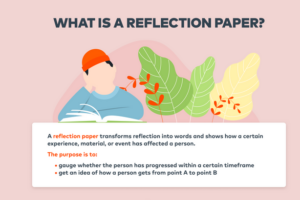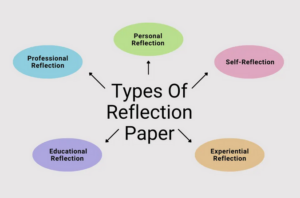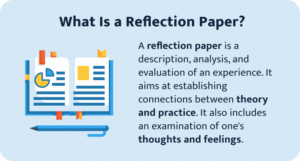How to Write a Reflection Paper: Simple Guide
 Writing a nursing reflection paper is an essential part of nursing education.
Writing a nursing reflection paper is an essential part of nursing education.
Reflective practice allows nursing students and professionals to critically assess their clinical experiences, connect theory with practice, and reflect on personal and professional growth.
Writing a reflection paper enables individuals to express their thoughts about their clinical practice, improve their understanding, and enhance their skills.
This guide will explain everything you need to know about creating an effective nursing reflection essay, covering nursing reflection paper guidelines, nursing experience reflection, and clinical reflection in nursing. Whether you’re reflecting on a critical incident or seeking to demonstrate personal and professional growth in nursing, this article will help you craft a detailed, insightful reflection paper.

Struggling to meet your deadline?
Get your assignment on How to Write a Reflection Paper: Simple Guide done by certified MDs and PhDs in the USA. ORDER NOW!
What is a Nursing Reflection Paper?
A nursing reflection paper is a written account of your experiences as a nursing student or professional, focusing on personal insights and learning outcomes from clinical situations. The goal of writing a reflective practice in nursing is to analyze how clinical experiences have shaped your nursing practice and helped you grow. This process requires self-assessment and critical thinking, allowing you to draw connections between theory and practice, identify strengths and weaknesses, and set goals for future development.
For nursing students, a reflection paper for nursing students serves as a valuable tool for assessing clinical placements, identifying areas for improvement, and reflecting on nursing student reflection papers. The reflection also fosters self-awareness, helping students and professionals develop greater emotional intelligence and better decision-making skills.
Why Writing a Nursing Reflection Paper is Important
Writing a nursing reflection paper offers multiple benefits:
- Encourages Self-Awareness: Reflective writing helps you critically examine your actions, emotions, and decisions during clinical practice, leading to a deeper understanding of your strengths and areas for improvement.
- Promotes Professional Development: Reflection helps you grow as a nurse, both personally and professionally. By analyzing your clinical experiences, you gain insight into how to handle future situations more effectively.

- Improves Clinical Knowledge: Reflecting on clinical experiences enhances your ability to connect theoretical knowledge from your nursing assignments, textbooks, and lectures with real-world practice.
- Facilitates Patient-Centered Care: Reflecting on patient interactions and experiences can help you become a more empathetic, compassionate, and effective caregiver.
Steps for Writing an Effective Nursing Reflection Paper
Writing a nursing reflection essay requires several key steps, from choosing the right topic to ensuring that your writing is reflective and well-structured. Below are detailed instructions and tips for writing a comprehensive nursing critical incident reflection.
1. Understand Nursing Reflection Paper Guidelines and Expectations
Before writing your reflection paper format for nursing students, you must understand the specific guidelines and expectations provided by your instructor or school. These could include details such as paper length, structure, content focus, and referencing style. Make sure to read through the nursing reflection paper guidelines to ensure your reflection paper adheres to academic standards.
2. Select a Relevant Clinical Topic for Reflection
When writing a nursing reflection paper, it’s crucial to select a topic that allows for deep personal insight and analysis. You may reflect on a nursing clinical placement, a critical incident in nursing practice, or a memorable patient care experience. Choose an event or situation that was significant to your development as a nurse. This can range from challenging patient care to moments where you felt you made a substantial contribution or faced a moral dilemma.
3. Brainstorm Key Nursing Experiences
Before writing your reflection paper, spend some time brainstorming and jotting down key experiences you want to reflect on. Think about moments in your nursing experience reflection that shaped your understanding of nursing practice. What worked well? What could you improve on? Use these reflections to guide the content of your paper.
4. Create a Nursing Reflection Paper Outline
An outline is essential for organizing your thoughts and ensuring a logical flow in your nursing reflection paper. This will also help you stay on track and avoid straying from the topic. A typical reflection paper outline includes:
- Introduction: Briefly describe the clinical experience you will reflect on and include your thesis statement.
- Body Paragraphs: Analyze the experience and explain what you learned from it. Incorporate relevant nursing theories and practice.
- Conclusion: Summarize your reflections, highlighting any personal or professional growth.
5. Write Body Paragraphs
In the body of your nursing reflection essay, discuss the experience in detail. Provide an overview of the situation and then analyze your feelings, thoughts, and actions during that time. For example, a critical incident reflection in nursing might involve reflecting on a difficult patient care situation and how you managed it. Analyze your decisions and what you learned about yourself and your nursing practice. If relevant, connect your reflection to evidence-based practice and nursing theories that were applied during the clinical experience.
6. Compose the Introduction and Conclusion for Your Nursing Reflection Paper
Your nursing reflection paper introduction should introduce the experience or event you will be discussing. Provide enough context for the reader to understand the significance of the experience. You should also present your thesis, which is the central point or lesson you learned from the experience.
In your conclusion, summarize your key insights and reflect on how the experience influenced your nursing professional development. You may also discuss how this experience will impact your future practice, such as applying newly learned skills or knowledge to improve patient care.
Tips for Writing a Successful Nursing Reflection Paper
1. Use Reflective Practice to Enhance Clinical Knowledge
Reflective practice is crucial for improving clinical nursing skills. It helps you process and learn from your experiences, allowing you to improve patient care. By incorporating reflective writing in nursing, you enhance your ability to critically evaluate clinical situations, making you more proficient in future nursing practice. 
2. Incorporate Nursing Theories and Evidence-Based Practice
A good nursing reflection paper should incorporate relevant nursing theories and evidence-based practice to demonstrate your understanding of the connection between theory and practice. For example, you could reflect on how applying the Nightingale Environmental Theory improved patient outcomes or how Maslow’s Hierarchy of Needs influenced your approach to patient care.
3. Avoid Plagiarism in Your Nursing Reflection Paper
Plagiarism is a serious academic offense, so it’s important to always properly cite sources you use in your nursing research or reflection paper. Whether you are quoting directly or paraphrasing, make sure to follow the correct citation style outlined by your instructor or institution.
Common Mistakes to Avoid When Writing a Nursing Reflection Paper
When writing your nursing reflection essay, be mindful of common mistakes that can affect the quality of your work:
- Lack of Depth in Reflection: Don’t just describe the clinical experience—explain what you learned from it, how it changed your practice, and how it contributed to your personal and professional growth in nursing.
- Poor Structure and Organization: Ensure that your paper follows a clear and logical structure. Use paragraphs to separate distinct ideas and maintain a coherent flow.
- Overuse of Jargon: Avoid using too much technical language. While it’s important to demonstrate your knowledge, keep your writing clear and accessible.
Reflection Paper Topics for Nursing Students
Here are a few ideas for reflection paper topics for nursing students:
- Reflecting on a Nursing Clinical Placement: Consider how your clinical experience shaped your understanding of nursing and your role as a nurse.
- Reflection on Patient Care Experiences: Reflect on a memorable patient interaction that impacted your practice.
- Analyzing a Difficult Nursing Case: Examine a challenging case and discuss the decisions made and lessons learned.
Types of Reflective Writing in Nursing
Reflective writing in nursing can take many forms. Here are several types of reflective writing in nursing that you may encounter:
- Reflective Experience in Nursing: Reflect on your nursing experiences during clinical placements or volunteer work. This helps you develop skills and evaluate your practice.
- Critical Incident Reflection in Nursing Practice: Reflect on a difficult situation or critical incident that challenged your nursing practice and how it affected your approach to patient care.
- Learning Log or Reflection Journal for Nursing: Keep a journal of your clinical experiences, noting challenges, successes, and areas for improvement.
Example of a Nursing Reflection Paper
For a better understanding of how to structure and write a reflection paper, it can be helpful to look at nursing reflective essay examples. These examples can serve as a template for organizing your thoughts and ensuring your reflection paper covers all necessary aspects.
The Role of Reflective Writing in Nursing Education
Reflective writing is a powerful tool in nursing education, helping students connect theory with practice. Through reflective practice in clinical nursing, students can deepen their understanding of nursing principles and improve patient care. By reflecting on their experiences, students also become more self-aware and better equipped to handle future clinical situations.
How to Write a Clinical Reflection Paper for Nursing Students
A clinical reflection paper is similar to a nursing reflection paper, but it focuses on specific clinical experiences. To write a clinical reflection paper, follow the steps outlined earlier: choose a relevant clinical topic, brainstorm your experiences, create an outline, and then reflect on the situation in detail, connecting it to nursing theory and practice.
Reflection Paper Format for Nursing Students
A typical reflection paper format for nursing students includes:
- Introduction: Provide a brief overview of the clinical experience and its relevance.
- Body: Analyze the experience, discussing thoughts, emotions, and lessons learned. Integrate theory and practice.
- Conclusion: Summarize your reflections and discuss how the experience will influence your future nursing practice.
Conclusion
In conclusion, writing a nursing reflection paper is an essential part of your nursing education and professional development. It encourages self-awareness, promotes critical thinking, and helps you improve your clinical skills. By following the steps outlined in this guide, you can effectively reflect on your clinical experiences and demonstrate your growth as a nurse. Reflective writing fosters continuous learning and improvement, ultimately leading to better patient care and a more successful nursing career.

Dont wait until the last minute.
Provide your requirements and let our native nursing writers deliver your assignments ASAP.